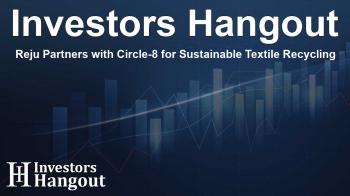Reju Partners with Circle-8 for Sustainable Textile Recycling

Collaboration to Enhance Textile Recycling in the U.K.
Reju™, known for its innovative approach to textile regeneration, has entered into a significant partnership with Circle-8 Textile Ecosystems. This collaboration aims to promote a circular textiles ecosystem within the U.K., enhancing the sustainability of the textile industry.
Investment in Recycling Infrastructure
Circle-8 will supply Reju's upcoming European Regeneration Hubs with essential feedstock derived from post-consumer textile waste. This will be processed through Circle-8's first digitized Automated Textile Sorting and Preprocessing (ATSP) facility, which is envisioned to lead to a network of large-scale industrial facilities. Reju plans to utilize this feedstock to produce its celebrated Reju Polyester™, which boasts a remarkable lower carbon footprint—50% less than traditional virgin polyester—and can be regenerated infinitely.
Efficiency in Textile Recycling
Patrik Frisk, CEO of Reju, emphasized the importance of this partnership, stating, "Working alongside Circle-8's evolving ecosystem and ATSP empowers us to boost the efficiency of textile recycling, streamlining processes, which in turn ensures a high-quality product that aligns with the rigorous standards of Reju for polyester." As consumers and manufacturers increasingly recognize the significance of diverting textiles from landfills, having automated and efficient processes becomes vital.
Creating a Fibres-to-Fibres Ecosystem
The alliance between Reju and Circle-8 is set to significantly enhance the U.K.'s infrastructure for textile processing, ultimately crafting a transparent and sustainable fibre-to-fibre ecosystem. By engaging with U.K. brands and retailers, the partnership will facilitate a transition towards a circular textile industry, ensuring that pre-sorted and processed feedstock can be sourced at scale for Reju's proprietary technology.
Aiming for Circularity in Textiles
"Reju and Circle-8 are unwavering in our commitment to realizing true indefinite textile-to-textile recycling in the U.K. and globally," noted Cyndi Rhoades, co-founder and CEO at Circle-8. She highlighted the critical nature of collaboration and innovation in converting textile waste into valuable resources, especially as regulatory bodies worldwide start taking coordinated actions on waste management.
About Circle-8 Textile Ecosystems
Circle-8 is paving the way for the new circular textiles industry by constructing an ecosystem capable of enabling efficient textile-to-textile recycling processes. The organization is focused on the design and establishment of automated sorting and preprocessing facilities aimed at transforming non-reusable textiles into feedstock for fibre recycling. Ultimately, Circle-8 aspires to launch industrial-scale recycling plants across the U.K. to address the significant volume of non-reusable textiles that end up in landfills each year.
About Reju
Reju specializes in developing pioneering solutions for regenerating polyester textiles and PET waste. With backing from Technip Energies and leveraging proprietary technology developed by IBM researchers, Reju aims to build a global circular ecosystem focused on recycling PET materials found in textiles, paving the way for a more sustainable future.
Frequently Asked Questions
What is the purpose of the Reju and Circle-8 partnership?
The partnership aims to enhance textile recycling processes in the U.K. by establishing a circular ecosystem that supports sustainable practices.
How does Reju's regeneration technology work?
Reju utilizes innovative technology to transform post-consumer textile waste into regenerated polyester, reducing the environmental impact compared to virgin materials.
What is the significance of Circle-8's ATSP facility?
The ATSP facility is pivotal as it digitizes sorting and preprocessing of textiles, making recycling more efficient and precise.
Why is circularity important in the textile industry?
Circularity helps in reducing waste and minimizing the environmental footprint of textiles, promoting sustainability in consumer goods.
What are the future goals of Reju and Circle-8?
Their goal is to create scalable solutions for textile recycling that meet upcoming regulatory standards and contribute significantly to sustainability initiatives.
About The Author
Contact Caleb Price privately here. Or send an email with ATTN: Caleb Price as the subject to contact@investorshangout.com.
About Investors Hangout
Investors Hangout is a leading online stock forum for financial discussion and learning, offering a wide range of free tools and resources. It draws in traders of all levels, who exchange market knowledge, investigate trading tactics, and keep an eye on industry developments in real time. Featuring financial articles, stock message boards, quotes, charts, company profiles, and live news updates. Through cooperative learning and a wealth of informational resources, it helps users from novices creating their first portfolios to experts honing their techniques. Join Investors Hangout today: https://investorshangout.com/
The content of this article is based on factual, publicly available information and does not represent legal, financial, or investment advice. Investors Hangout does not offer financial advice, and the author is not a licensed financial advisor. Consult a qualified advisor before making any financial or investment decisions based on this article. This article should not be considered advice to purchase, sell, or hold any securities or other investments. If any of the material provided here is inaccurate, please contact us for corrections.

